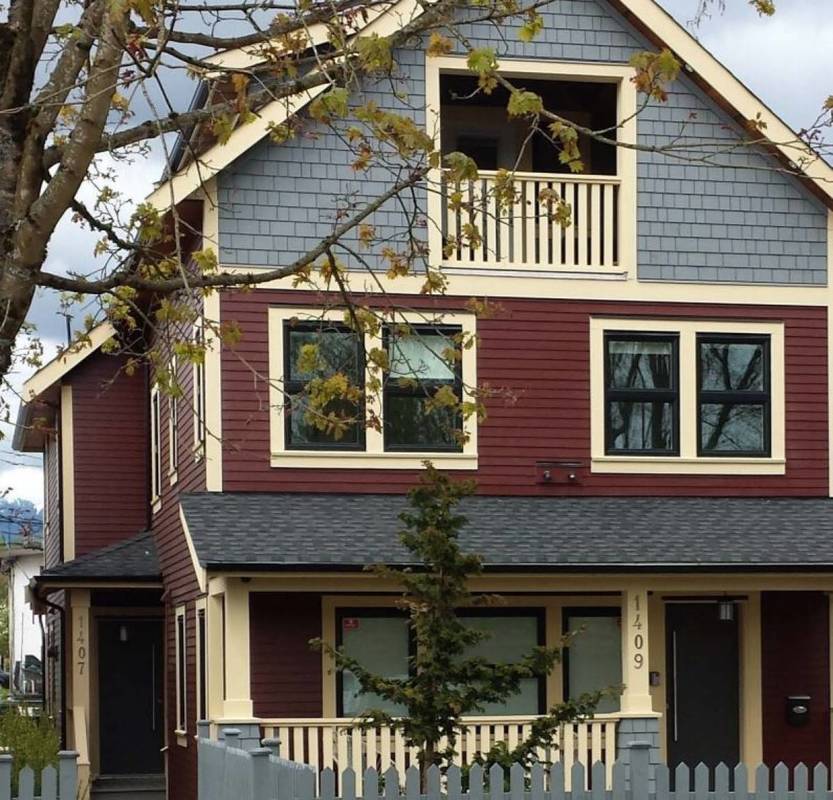|
JOANNE LEE-YOUNG (VANCOUVER SUN) It was a move closely watched because allowing for duplexes is seen as a nod to a “quick-start action” that will pave the way for later allowing triplexes and multi-unit buildings in single-family neighbourhoods and is part of a broader program to increase housing options across the city.
Vision Coun. Kerry Jang cast it as a “polemical debate” between “those who fear change and people saying they need a place to live.” It was the last major decision for Vision Vancouver, a party that has ruled for a decade, but will not have a council majority in the next term. City hall veterans in Vancouver have long described changing single-family neighbourhoods as an issue that is basically to be avoided or untouchable because it can only lead to political ruin. “There’s no doubt the idea of massive, blanket rezoning of single-family areas is very much a third rail. … There has always been something about keeping the sanctity of single-family zoning,” said former six-term councillor Gordon Price, heading into the evening portion of last night’s public hearing and ahead of knowing the evening’s outcome. “The parameters of the housing crisis have changed and are changing,” he said. “You have to think about them and what has changed.” He added, however, that with new supply coming on and a change in sales and prices and other aspects, “you have to sculpt a plan. The demand for consultation is real.” When the vote came late Wednesday, councillors Melissa De Genova, George Affleck, Elizabeth Ball and Adriane Carr opposed. Councillors who opposed the mass rezoning said the process has been too rushed, with residents given too little time to consider the change. NPA Coun. Hector Bremner said he supports duplexes as an integral part of middle-class neighbourhoods, but protested the “broken process.” The NPA’s De Genova, who had tried and failed to have the issue deferred to the new council to be elected on Oct. 20, said she could not support a “one-size-fits-all” proposal. “Density must be done neighbourhood to neighbourhood,” she said. Carr, of the Greens, said there are too many outstanding questions, including whether the rezoning would make affordability better or worse. But Vision’s Kerry Jang said the rezoning was designed to give people options. For example, people could split their home to make room for adult children, who can’t afford to live in Vancouver now. “Our job as a city government is to provide as many options as possible so people can choose.” Vision’s Raymond Louie called it “gentle densification.” And Mayor Gregor Robertson said he supported the rezoning as a minor start to dealing with the terrible unaffordability. “This is not a silver bullet; it is an important first step,” he said. “We’re going to take a lot more action in the years to come.” “We have to deal with the fact that more than half of the City’s land base is zoned exclusively for single family homes – homes that are out of reach for the overwhelming majority of residents.” He likened the impact of the duplex rezoning to the minor effect on neighbourhoods experienced after allowing laneway housing. Earlier, as council listened to members of the public, they heard criticism of Vision Vancouver for pushing for what they called significant changes without enough discussion “on the eve of an election.” “There is lots of transition,” in the housing market right now, said Joan Rush, a retired lawyer and west side resident Joan Rush. “Why don’t you wait and see what will happen.” “There are already areas with duplexes,” said Ronald Hatch, a publisher who described himself as a longtime Vision Vancouver supporter, but one opposed to the rezoning. Instead of blanket zoning across the city, there could be pilot projects in areas where it makes sense, he said. “We should do it with citizens being more involved,” said Mel Lehan. “I am for adding purpose-built rental and density in certain areas.” The public hearing heard from 60 speakers over two days. Going into the second day, there were 306 letters against the motion, including two petitions, against 186 letters in support, including one with 50 signatures. “It’s interesting. Vision Vancouver had a very lengthy run. We’ve had an incumbent party that has been working at the end to continue and go through a process of renewal,” said Stewart Prest, instructor of political science at Simon Fraser University and Douglas College. “They were trying to re-engage in the form of developing their housing strategy and the crisis broke to the forefront. It was a big change from when no one was talking about it to them being overtaken by it.” He said a heated discussion about housing has altered former partisan lines. “The 50,000-ft view is that housing broke the party system in Vancouver, along with financing changes that have allowed for more voices to join.” Now, said Prest, there is a new spectrum of “urbanist” and “conservationist” parties, and there are many more diverse speakers in the discussion for and against opening single-family areas to greater density. “Ongoing awareness of affordability issues has shaken things loose.” |
Market UpdateUpdates on Real Estate news happening in your city. Archives
January 2024
Categories
All
|

